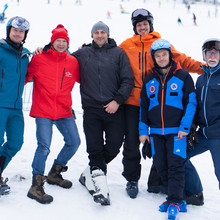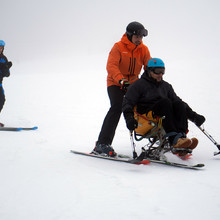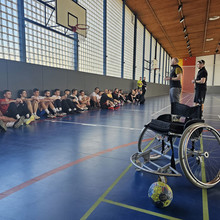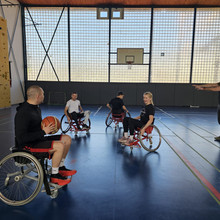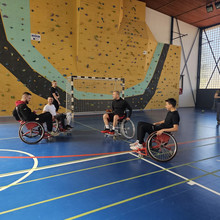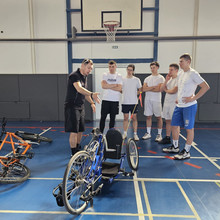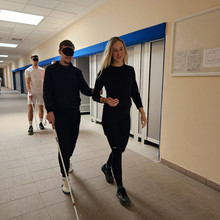Between March 17 and 21, 2025, representatives from the Department of Adapted Physical Activities (APA) at FTK undertook an international visit to the University of Sarajevo. The aim of this educational mission was to establish closer collaboration, share professional know-how, and inspire the academics and students in the field of adapted physical activity. During the stay, the FTK representatives worked to support the currently infusion-based implementation of APA topics within existing courses, while also contributing to the development of a new study program in Adapted Physical Activity at the University of Sarajevo.
This visit followed up on a cooperation initiative launched in January 2025, when faculty members from the University of Sarajevo's Faculty of Sport and Physical Education participated in the international APA Winter Camp organized by FTK’s Department of Adapted Physical Activities at the ski resort of Kareš. During that camp, they gained their first hands-on experience teaching skiing to individuals with disabilities. The January mobility laid a strong foundation for the March trip to Bosnia and Herzegovina and significantly enhanced both mutual understanding and professional connections between the two institutions.
The main focus of the March visit was the delivery of skiing instruction for individuals with disabilities and the sharing of experience in this specific form of physical activity with students and teachers at the University of Sarajevo. The lessons took place at the beautiful Bjelašnica ski resort, one of the venues of the 1984 Winter Olympics. Despite limited snow conditions, the program offered participants a one-day mono-ski training session complemented by a workshop for both internal and external university staff (promotional video from the training available here). A systematic educational framework for mono-skiing does not yet exist in Bosnia and Herzegovina, or is only just emerging, which is why this introduction to the discipline held significant importance. For many participants, it was their first experience of this kind and could serve as an important catalyst for further development of inclusive sports in the country.
Due to adverse snow conditions, the program was expanded to include other thematic teaching blocks. In addition to skiing, the FTK team led indoor adapted activities such as boccia, tandem and handbike cycling, orientation for individuals with visual impairment, and dryland training for skiing with disabilities. The theoretical part of the program focused on presenting the APA Center as an example of good practice—not only in terms of its activities, but especially highlighting the wide range of physical activities and courses delivered as part of the FTK curriculum. Each seminar group involved approximately 25 students, while the practical skiing sessions and workshops had about half that number of students.
Three instructors and one staff support member from FTK were involved in the educational activities offered, as well as external guests from the Czech Republic, including an experienced mono-ski skier with a physical disability, who participated at their own expense and provided valuable support, particularly during interactive workshops.
Sarajevo—a city with a rich history, cultural diversity, and welcoming atmosphere—proved to be an ideal setting for international cooperation. As the largest and oldest university in the country, the University of Sarajevo has shown great interest in developing the field of Adapted Physical Activity, and any form of expert support has a tangible impact and considerable potential here. Professional guidance, sharing of practice, and exchange of experience are highly valued there.
From FTK’s perspective, Sarajevo is not only an attractive destination for future student mobilities, but also a place where building long-term partnerships and increasing awareness of disability-inclusive approaches makes real sense. Ongoing reconstruction of the faculty’s infrastructure, including the construction of a new swimming pool, renovation of the outdoor sports field, and full accessibility of all sports facilities support the current efforts.
FTK looks forward to continuing this partnership of both professional value and personal significance.

